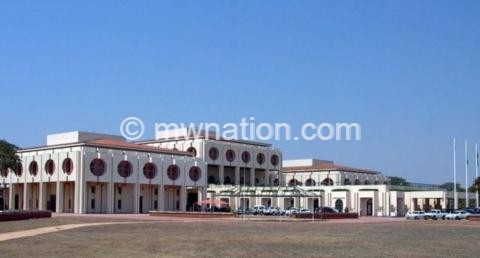State House headcount fails
The National Audit Office has, since 2016, not conducted a head count at State House—an exercise government embarked on in 2015 to flush out ghost workers in the public service, NAO told Weekend Nation this week.
In May 2016, former Auditor General (AG) Stephenson Kamphasa told a joint parliamentary committee for the Public Accounts and Budget and Finance that his office was unable to conduct the exercise after State House communicated that staff at Plot Number One were busy.

But presidential press secretary Mgeme Kalirani dismissed the claims on Wednesday in an interview, saying State House communicated to NAO a long time ago that State House was ready for the exercise.
Said Kalirani: “They [NAO] can come anytime when they are ready.”
NAO spokesperson Rabson Kagwam’minga confirmed in an interview on Tuesday this week that the head count for State House which was supposed to be conducted alongside other government security organs such as the Malawi Defence Force (MDF) and Malawi Police Service (MPS) has not been done for the same reason State House gave in 2016.
Said Kagwam’minga: “Our mandate as National Audit Office covers a lot of ministries, departments and agencies (MDAs), and we cannot be waiting for one exercise, so we decided to be doing other things while keeping in mind that we have that assignment at State House.”
Kagwam’minga asked for more time to check if NAO indeed received the said communication from State House, inviting the audit office to conduct the head count.
On his part, Kalirani could also not say when and how State House communicated to NAO that they were ready for the exercise.
Asked why NAO has not been auditing State Residences as a recipient of public funds and as required by the Public Audit Act, Kagwam’minga said audits are conducted depending on need, public outcry, availability of funds and assessed risks.
“As much as NAO would want to regularly do the audits, they are sometimes done in an ad hoc manner because we don’t want people to get used to the system and prepare for the tasks,” he said.
According to the NAO spokesperson, the audit, which would have included a head count, followed a risk assessment and would have been the first of its kind at the institution since the multiparty dispensation.
During previous administrations, State House was not being audited as it was not deemed as a risky area on mismanagement of public funds, said Kagwam’minga.
Finance Minister Goodall Gondwe, whose ministry commissioned the headcount, indicated in an earlier interview that a similar exercise in other MDAs removed 2 300 people from the payroll, a measure, he said was expected to result in a reduction in the wage bill by an estimated K4.1 billion during the 2015/16 fiscal year.
Gondwe also indicated that the headcount revealed that an estimated 10 percent of the public service labour force of 177 000 employees needed further tracking to establish their authenticity.
Meanwhile, a governance expert has described failure to conduct the head count at State Residences as indicating a deeply entrenched culture of impunity among those in power, “who think laws do not apply to them”.
Political analyst Rafiq Hajat explained in a telephone interview on Tuesday that unless the country imposes strict adherence to the rule of law and due process, the future on governance and accountability looks bleak.
“This is just a tip of an iceberg, it is barely an indicator but the challenge is much deeper than the headcount at State House,” said Hajat adding that some people at State House believe that ordinary laws don’t apply to them because they are in the highest office of the land.
The public service has a long history of ghost workers who have been costing Treasury a lot of money and over the years, government has experimented with various measures to root out the problem.
In June 2011, former finance minister Ken Kandodo announced during the 2011/12 national budget presentation that 4 878 ghost workers had been flushed out of the public service saving government K3.6 billion annually. The development prompted government to start paying salaries and allowances through commercial banks.
The headcount was also done against the background of a report released in 2015 by audit and financial advisory firm PricewaterhouseCoopers (PwC), which showed that K577 billion (revised to K236 billion) in government bank statements could not be reconciled between 2008 and 2014.
A forensic audit by RSM Risk Assurance Services LLP of UK on the K577 billion audit reduced the amount to K236 billion.





